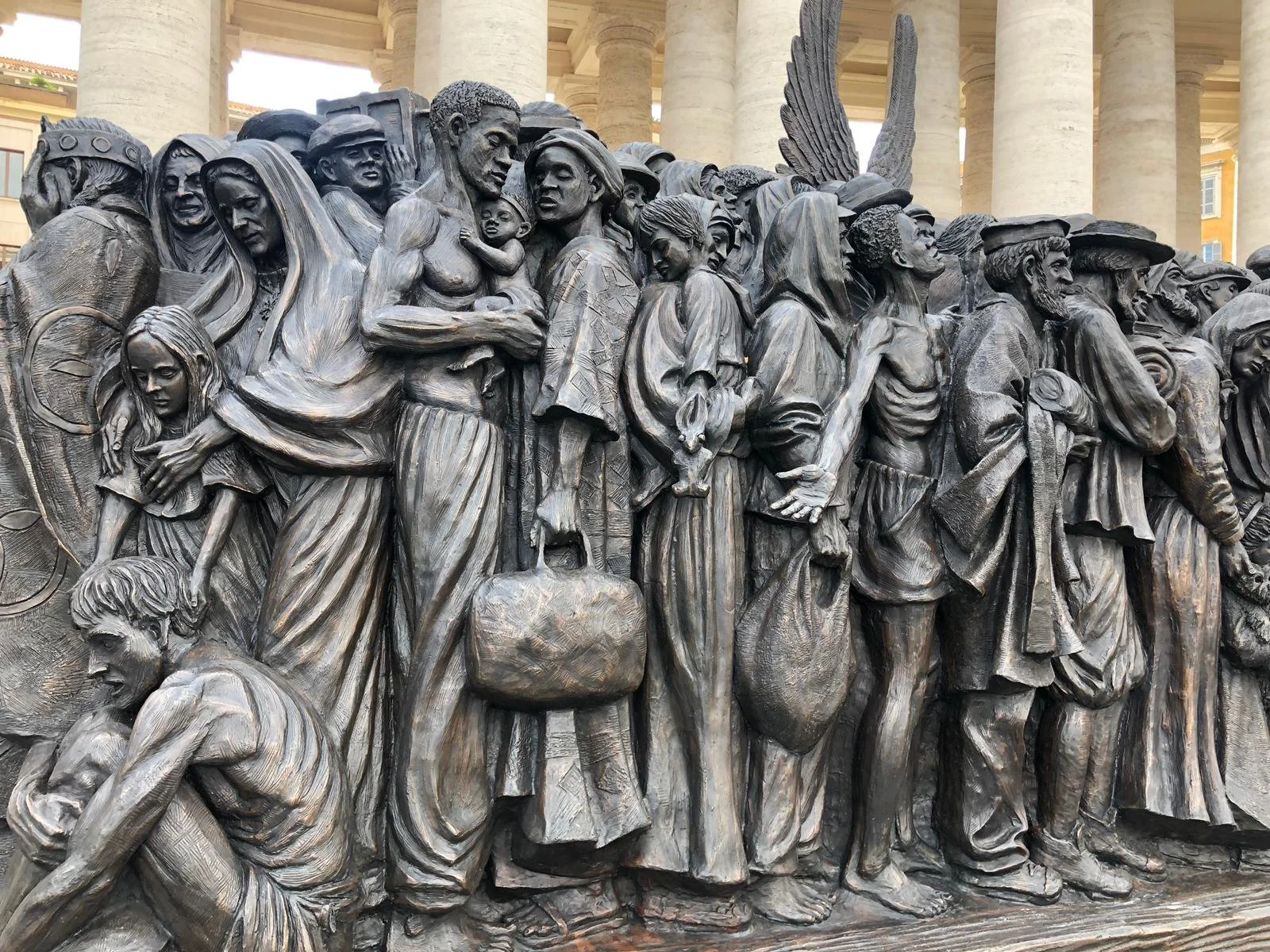Immigrants and the American Promise: Labor Rights and Reform
Integral Human Development. Angels Unawares. Timothy Schmalz’s bronze sculpture in St. Peter’s Square, portraying migrants and refugees as sacred strangers.
“Mr. Speaker, our nation depends on immigrants’ labor, and I hope we can create an immigration system as dependable as they are.” Those were the words spoken by Representative Gutiérrez on the floor of the U.S. Congress in 2005. I agree with Representative Gutiérrez. The U.S. depends on immigrant labor, yet the current immigration system neither protects immigrants fairly nor reflects the economic value of their contributions. Many immigrant workers face dangerous working conditions, lack access to federally funded safety net programs, and are constrained by their legal status. There is no doubt that the immigrant question was salient in 2005 and Representative Gutiérrez’s remarks continue to echo the immigration discourse today.
To create a system as dependable as the labor immigrants contribute, the U.S. must provide stronger labor protections and establish clear pathways to legal status for immigrants.
From Irish to Chinese mass migration, immigrant labor helped build the very roads, railroads, and cities we see and admire every day. Immigration has long been a backbone of the U.S. economy and the “American life.” The term “American” not only traces back to the founding of the U.S., but it is also tied to notions of privilege and access granted to citizens (“Americans”). Citizens, and by extension people with a legal status, are not only allowed to work in the U.S. but may also receive benefits that undocumented workers may not. The current set of actions by the U.S. Government exacerbates undocumented immigrants' uncertainty, as debates surrounding birthright citizenship, border policing, and the reinstatement of the “remain in Mexico policy,” continue to perpetuate the outlook that undocumented immigrants are a threat to national security. More recently, the U.S. Supreme Court ruled that ICE agents may use ethnicity and race to make immigration stops. In 2025, the immigrant question is still entrenched with notions about who deserves rights – and more importantly, on labor equality and benefits.
U.S Economy: Immigrant Labor and Broken Policy System
Immigrants are essential to the U.S. economy, yet they face inconsistent protections that fail to match their contributions. According to the U.S. Bureau of Labor Statistics, 19.2% of immigrants account for the U.S Labor Force. This accounts for numerous jobs in fields such as agriculture, domestic work, construction, and more. Many of these jobs are physically demanding and high-risk, yet immigrant workers often cannot access the same legal protections as citizens (or documented workers), including federally funded safety programs such as Medicaid and Medicare, and more. While labor laws like the Fair Labor Standards Act (FLSA) and the Occupational Safety and Health Act (OSHA) technically cover all workers, undocumented immigrants frequently cannot enforce these rights due to fear of deportation, employer retaliation, or lack of legal representation.
Some state workers’ compensation programs explicitly exclude undocumented employees, leaving them vulnerable to injury. For example, during the COVID-19 pandemic, immigrants became a crucial part of multiple economic sectors. “Six million immigrant workers [were] at the frontlines of keeping U.S. residents healthy and fed during the COVID-19 pandemic,” by working in sectors such as mobile-app delivery and more. However, undocumented workers were excluded from federal stimulus relief programs, such as the expanded child tax credit. The COVID-19 pandemic highlighted this gap between contributions and protections. Undocumented workers should be able to report unsafe conditions, receive fair wages, and access workers’ compensation without risking deportation or employer retaliation. Strengthening these protections would allow the U.S. to uphold human rights and protections for all.
The Urge For Reform
Representative Gutiérrez’s words are still true today: the U.S. depends on immigrant labor, but our immigration system yields disparities in labor. In 2025, the rise of anti-immigrant rhetoric and historically inconsistent policies continues to perpetuate an uncertain and frustrating life for undocumented workers to live by. A core American founding principle is “life, liberty, the pursuit of happiness” for all. Yet again, we find ourselves questioning the “all” in such a principle. Immigrants should be considered a part of such a principle and they deserve the right to life, liberty, and the pursuit of happiness, but also human dignity. If lawmakers do not act now, the disparity between what America professes to hold dear and how it treats immigrant workers will continue to grow. I believe the U.S. should ensure immigrant workers benefit from fair labor protections without fear of reprisal and clear avenues to legal status. Such reforms may hold America to its principles of fairness and opportunity.
The immigrant question in 2025 brings us back to the philosophical and epistemological inquiry that many philosophers and thinkers debated ages ago: citizenship. Who is considered a citizen in our contemporary times? The protections of citizenship are not granted to immigrants. Instead, the media fuels the rhetoric that immigration is an "illegal act." This rhetoric is tied to a bigger question: What does it mean for a person to be recognized as a “citizen” under the law? While I may not have all the answers, and perhaps the discourse on immigration will continue to unfold and evolve in the months and years to come, I know that there is a need: lawmakers need to establish – and cement – an immigration system as dependable as the workers who make it work.
Sanvi Das is a senior at Clarksburg High School. She is interested in public policy and political economy, and is the 2025 winner of the Columbia Hispanic Pre-Law Review High School Essay Contest.
